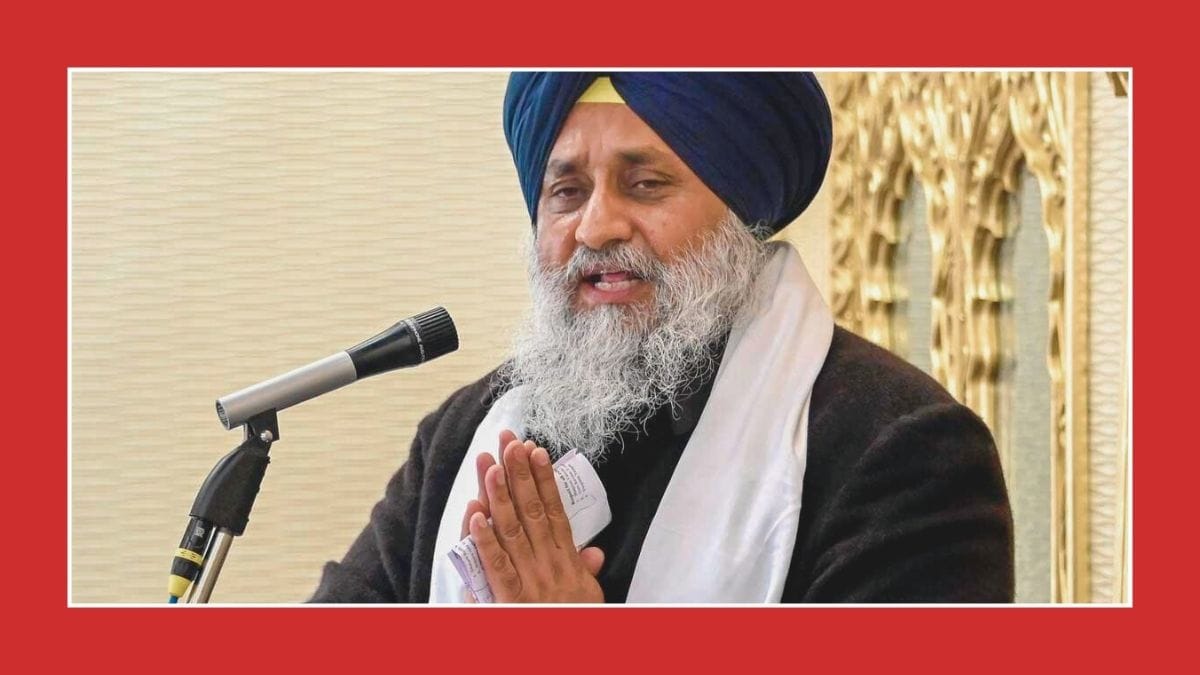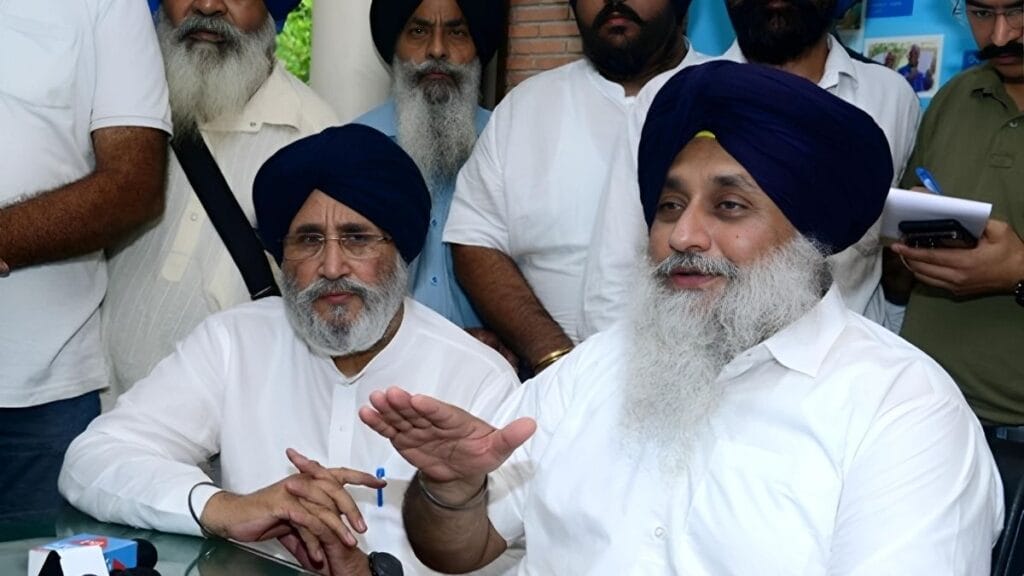SAD Chief Sukhbir Badal Seeks Forgiveness for Past Mistakes
In a significant development, Shiromani Akali Dal (SAD) chief Sukhbir Singh Badal has sought “unconditional forgiveness” for the mistakes committed during the party’s time in power.
This plea for absolution was formally communicated in a three-page letter submitted to Giani Raghbir Singh, the jathedar of Akal Takht, the highest temporal seat of the Sikhs.
This move comes in response to accusations leveled by rebel leaders within the party, who have criticized Badal’s leadership and called for his resignation.
The letter from Badal follows a meeting where rebel Shiromani Akali Dal leaders, including former MP Prem Singh Chandumajra and ex-Shiromani Gurdwara Parbandhak Committee (SGPC) chief Bibi Jagir Kaur, appeared before the jathedar. They sought forgiveness for four significant mistakes made during the party’s rule between 2007 and 2017.
These errors include the failure to punish those responsible for the 2015 sacrilege incidents and the controversial pardoning of Dera Sacha Sauda chief Gurmeet Ram Rahim Singh in a 2007 blasphemy case.
Key Issues and Controversies
- 2015 Sacrilege Incidents: The sacrilege incidents of 2015, which involved the theft of a ‘bir’ (copy) of the Guru Granth Sahib, the appearance of handwritten sacrilegious posters, and the scattering of torn pages of the holy book at Bargari in Faridkot, were pivotal events that marred the SAD’s tenure. During the subsequent anti-sacrilege protests, police firing resulted in the deaths of two individuals and injuries to several others. The rebel leaders have pointed to the government’s inability to bring the culprits to justice as a major failing.
- Pardoning of Gurmeet Ram Rahim Singh: Another contentious issue was the 2007 blasphemy case against Gurmeet Ram Rahim Singh, the head of Dera Sacha Sauda, for allegedly imitating Guru Gobind Singh, the 10th Sikh master. Badal’s alleged influence in securing a pardon for the Dera chief, a decision that was initially accepted by the Akal Takht but later annulled due to community pressure, remains a source of deep resentment among many Sikhs.
- Sumedh Singh Saini’s Appointment: The appointment of Sumedh Singh Saini as the Director-General of Police during the SAD regime has also been criticized. The rebel leaders argue that Saini’s tenure was marked by decisions that contributed to the party’s downfall and increased public discontent.
In his letter, Badal expressed humility and devotion to the Guru Granth Sahib and the Akal Takht. He stated, “Whatever has been written against us, I present myself before the great throne of the Guru, seeking unconditional forgiveness from ‘Guru Sahib’ and ‘Guru Panth’.”
He emphasized his role as a humble servant and took personal responsibility for all mistakes, whether they originated from the party or the government, knowingly or unknowingly.
Badal also referenced an October 2015 letter from his father, Parkash Singh Badal, who was the chief minister at the time, addressing some of the tragic incidents in Punjab between 2007 and 2015. This letter was included to provide context and show an ongoing commitment to seeking reconciliation and addressing past wrongs.
The Akal Takht Secretariat in Amritsar has confirmed that the five Singh Sahibans (Sikh high priests) will convene a meeting in the coming days to deliberate on Badal’s letter. This decision will be critical in determining the future course of action for the SAD and its leadership.
The plea for forgiveness and the forthcoming decision by the Akal Takht are expected to have significant implications for the Shiromani Akali Dal.
The party, which has seen internal strife and a decline in electoral fortunes, especially after the recent Lok Sabha polls debacle in Punjab, is at a crossroads.
Badal’s acceptance of responsibility and his appeal for forgiveness could be seen as an attempt to heal internal rifts and rebuild trust within the party and the broader Sikh community.
The Shiromani Akali Dal’s request for unconditional forgiveness from the Akal Takht represents a critical moment of introspection and accountability for the party.
As the Sikh high priests deliberate on this plea, the outcome will not only influence the future of SAD but also serve as a reminder of the importance of humility and responsibility in public life.
This episode underscores the enduring significance of the Akal Takht in upholding moral and spiritual standards within the Sikh community.
Why did Sukhbir Singh Badal seek forgiveness from the Akal Takht?
Badal sought forgiveness for mistakes committed during the Shiromani Akali Dal’s rule, including the handling of the 2015 sacrilege incidents and the pardoning of Dera Sacha Sauda chief Gurmeet Ram Rahim Singh in a blasphemy case.
What were the main criticisms by the rebel leaders against Badal?
Rebel leaders criticized Badal for the party’s failure to punish those responsible for the 2015 sacrilege incidents, the controversial pardon of Gurmeet Ram Rahim Singh, and the appointment of Sumedh Singh Saini as Director-General of Police.
What is the significance of the Akal Takht in Sikhism?
The Akal Takht is the highest temporal seat of the Sikhs, serving as a central authority for resolving issues within the Sikh community and upholding moral and spiritual standards.
What did the October 2015 letter from Parkash Singh Badal address?
The letter addressed tragic incidents in Punjab between 2007 and 2015, providing context and showing a commitment to seeking reconciliation and addressing past wrongs.
What are the next steps in the forgiveness process?
The five Singh Sahibans (Sikh high priests) will meet to deliberate on Badal’s letter and decide on the appropriate course of action.
How might this forgiveness plea impact the future of the Shiromani Akali Dal?
The plea could help heal internal rifts, rebuild trust within the party and the broader Sikh community, and influence the party’s future direction and leadership dynamics.
Stay connected with NH Punjab on social media. Follow us on Facebook, Twitter/X, and Instagram for the latest news updates, behind-the-scenes content, and more. Engage with us online and be a part of our growing community.
Sign up for our newsletter to get the latest news delivered straight to your inbox. Follow us on social media for real-time updates and engaging content.
Have questions or need more information? Feel free to reach out to us through our Contact Page. You can also learn more about our mission and team on our About Page.
For more details, visit our Privacy Policy, Disclaimer, and Terms and Conditions.
Stay connected with NH PUNJAB (Punjabi), where your news journey begins.



